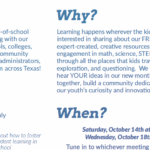talkSTEM refers to STEM as a “real-world, inquiry-based exploration of the world around us, to break down artificial barriers between disciplines” In a Women in Tech panel hosted by the University of Dallas at Texas in collaboration with talkSTEM, a STEM mindsetwas defined as learning how to continuously educate oneself, explore, and become brave enough to make mistakes.
In our personal experiences, we agree with the Women in Tech panel that continuous exploration is a significant aspect of our STEM Mindset, especially during the school year. For example, this school year, we are taking AP Physics and learning to drive. As we learned the concepts of friction, centripetal acceleration, and drag, we found our STEM Mindsets constantly thinking about the connections between the theory practiced inside the classroom and the practical knowledge outside of it. Concepts like how the car’s velocity and the friction of the roads work together to keep the car from flipping over when making a turn and the importance of having threaded tires for proper torque and acceleration allowed us to gain a greater understanding of how people engineered vehicles for effective transportation.

STEM Mindset is a Growth Mindset

Why are mindsets important? In the 1970s, American psychologist Carol Dweck ran studies on children and their reactions to challenges and failure. Some students actively sought out challenges and problems, while others preferred to avoid challenges altogether. Because of these seemingly opposite responses, their reactions were categorized into two groups: The Growth Mindset, and the Fixed Mindset. Dweck theorized that these different reactions were due to the children’s underlying beliefs about intelligence, which consequently were either limiting or enhancing their growth.

In a fixed mindset, a population tends to believe their abilities and intelligence are innate traits that are static and unchangeable. As a result, they may avoid challenges for fear of failure or setbacks, seeing them as an indication of their inherent worth. In contrast, people with a growth mindset believe that their abilities and intelligence can be developed through continued effort and education. They view challenges as opportunities for growth and learning and view failures as stepping stones toward improvement.

How does this relate to STEM? Many fields in STEM contain failure as an integral part of the process of discovering or creating new ideas. In the scientific process, experimentation is an extremely important step that allows for the collection of data in the natural world. In the engineering process, design, prototypes, and subsequent testing and iteration are crucial aspects of creating lasting works. In mathematics, claims must always be supported by sometimes extremely difficult proofs verifying them. To us, a STEM Mindset does not necessarily come as a result of innate ability or knowledge. Instead, it is a continuing process of learning constantly from the surrounding world through questioning and analysis. So, learning STEM whether in school or anywhere must incorporate this essential ingredient of failing and then figuring out the next steps!
What does a STEM Mindset mean to others?
Over this past summer, we sent out a survey to high schoolers in the DFW area to get an understanding of what a STEM Mindset means to them. 45% of the participating students expressed that they believed they had a STEM Mindset. But how did they define a STEM Mindset? To objectively compare how students viewed a STEM Mindset, we asked them to select which qualities they associate with the possession of a STEM Mindset. Responses showed an overwhelming majority (84%) expressing that “curiosity/ a thirst for knowledge” is the criteria for a STEM Mindset; 5.2% associated a STEM Mindset with logical and mathematical thinking
In an open-ended question, one participant expressed,
“Well, if taken very literally, the term ‘STEM Mindset’ sounds very closed. It sounds like you’re focused strictly on STEM topics as a means to the betterment of society. While this is true for the way I think, I like to explore human ideas beyond the reach of STEM education while remaining grounded within the analytical STEM thought process to arrive at novel solutions to interesting problems.”
We agree that a “STEM Mindset” is not limited to STEM knowledge but encapsulates the pure skill of using analytical thinking and having the courage to desire challenges in learning. Just as hearing other students’ ideas of a STEM Mindset allowed us to see the mindset from a new perspective, we invite you and your teachers to talk about what a STEM Mindset means to you!


Conclusion
Regardless of how we define a STEM Mindset, it is clear that having a mindset focused on growth is important to not only future careers but to personal fulfillment as well. A growth mindset can be constantly worked towards by intentionally seeking ways to cultivate curiosity and curiosity, according to the majority of our survey respondents, which defines STEM mindsets. Throughout our internship, creating Math Walks stops and touring existing Math Walk stops in the Dallas area revealed the importance of personalized questions embedded in lived experiences; for example, asking questions about mathematical patterns at the local North Park Mall and Klyde Warren Park helped cultivate our curiosity and ability to look at other places and experiences through a STEM Lens. Here is a math walk stop posted as a reel on talkSTEM’s instagram platform made by one of us! We hope you will join the community on instagram (@talkingSTEM) or tiktok (@talkSTEM) to go places and grow your STEM mindsets at the same time!
Over the summer, being brave enough to make mistakes was one of the biggest aspects of our growth. When one of us first began our biomedical engineering research internship, they knew nothing about shear waves. They were working with new technology neither they nor their mentor had used before, without any background knowledge relevant to my project, and as a result, they wholeheartedly struggled. At lunch, they would sit with the other interns and talk with them about their projects. Everyone was doing amazing things and working hard towards a grand goal. They realized they could not simply wait for an answer to come to them. So, they racked my brain for solutions and did the next best thing: start from scratch. They read the manuals for each of the machines they were using, carefully tested parameters, and contacted the manufacturers of the devices to make sure the voltages being used would not ignite the office. They were not the smartest or best writer, but they found solutions when they were lost. They had developed initiative when a personal challenge stumped them, and gained knowledge of a fascinating and rapidly developing field that permits engineering and technology to help doctors better treat people in underdeveloped communities.
Our data shows that most students are aware and believe it is “very important” to have a STEM Mindset. For this reason as well as our personal experiences over the summer, we feel that we all must find ways to continually develop our STEM mindsets through embracing challenges and learning from failure, making connections between our everyday places and experiences, and asking questions about the environment around us.
About Our Interns:
Christine Lee and Francisco Salazar are high school students in North Texas.



